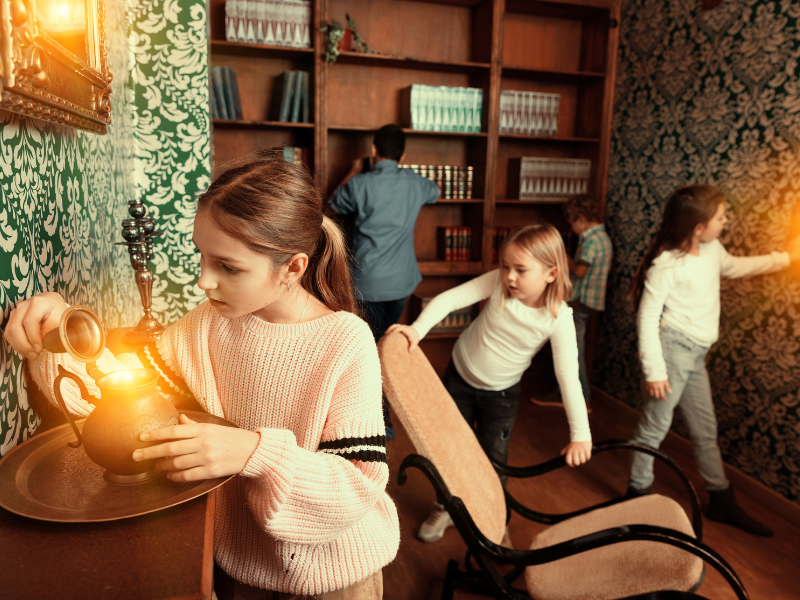You may have heard of escape rooms. They originated in Japan in 2007, created by a man named Takao Kato who was inspired by computer-based labyrinths from online games. He had heard people liked to solve puzzles and escape from single rooms, so he brought that concept to life in 3D. It spread to other countries and eventually made it to the United States around 2012.
Today, there are escape rooms throughout the DMV. Escape rooms are great ways for families to spend fun times together while reviewing clues and solving puzzles.
What are some unique aspects of escape rooms?
Escape rooms are theme-based and storyline-driven activities that play out in quick, 60-minute sessions. Each escape room features a different adventure that offers fascinating physical objects and unique clues. Players are locked in a room and generally work together to review clues, solve puzzles and unlock the door to escape the room.
According to Clue IQ: An Escape Room Experience in Frederick, Maryland, “An escape room is an immersive experience that will transport you to a unique environment, through the use of room design, game props and special effects.” Children will enjoy the immersive experience of an escape room because they will feel as if a thrilling book or movie has jumped out of its flat media and inflated itself as giant and exciting as a moon bounce.
At what age is it appropriate for children to go to escape rooms?
Escape rooms are designed to be fun, imaginative adventures and are appropriate family-friendly activities for all ages. According to Michael Davis, general manager of The Escape Game in Georgetown, “kids often do better than adults because adults overthink things and hold onto the clues. Children dive headfirst into the puzzles.” In some cases where the storylines from an escape room might be too intense for young children, websites will post suggested ages, for example, starting at teens.
How to keep kids from getting scared in escape rooms?
Mission Escape in Annapolis recognizes that the wording in the clues might frighten some children. “Please note: while props may contain wording such as ‘high voltage,’ ‘hazardous,’ ‘danger,’ ‘beware,’ etc., everything is harmless and in keeping with the story/theme of the room.” Knowing that the wording of some of the clues in the escape rooms could cause concern to children who might not clearly understand all that is involved, parents should talk to their children ahead of time. Go over the concept of escape rooms and explain how they work, to help calm children and prepare them for a fun adventure.
According to Escapology in Bethesda, players are not really locked in a room, because “Fire marshals would never allow that … You will be so immersed in the game that you won’t even think about it!” Escapology and other escape rooms also offer separate, hidden control rooms that carefully monitor the actions of the players in the escape rooms. The control rooms have game masters who can offer clues if players get stuck, but they are also equipped to help children feel at ease if the theme or puzzle overwhelms them.
As Michael Davis says, “kids might get scared because the room is too dark. We can offer stuffed animal mascots to encourage kids to bring them along on the adventure. If that doesn’t work, the kids can go into the control room. They can help us give out clues. They usually get a kick out of it.”
What skills can kids build in escape rooms?
According to Unlocked History Escape Rooms in Charlottesville, Virginia, “there is simply no better way to teach students and children than through fun activities. Each escape room promotes problem-solving, teamwork and logical thinking all wrapped in local … history and literature.”
Reviewing the clues and making educated guesses are great skills to solve the puzzles. According to Escape Rooms of Southern Maryland, players should have “An open mind, observation skills and attention to detail.” These are all helpful skills children can use and sharpen as they figure out how to escape the rooms.
Perhaps the most transferable skill of all is working cooperatively as a team to make sure everyone has access to the clues and can work in harmony towards the same goal. This involves looking at objects, making sure everyone can identify the object, reviewing any text from the clues and allowing all members of the team to respond and provide suggested answers.
Teamwork during a fun activity like escape rooms can help children in school and during civic activities, and can teach them to work well with others. It can also guide children in socializing better and getting along with people who have different abilities and personality types.
How do teens benefit from going to escape rooms?
All escape rooms contain adventures with varying levels of difficulty. It is suggested that children work cooperatively as a family unit to help solve the puzzles. In some instances, the nature of the clues and puzzles renders advanced levels of difficulty and complexity. That is when escape rooms suggest an adventure is best for children at least 13 years of age, because they will have the logic and relevant life experiences needed to understand and therefore solve the puzzles more easily.
At this age many escape rooms allow kids to play without an adult, so teens benefit from the opportunity to build upon their skills independently.
Visiting escape rooms
Due to COVID and ongoing safety measures, players in most cases will book escape room experiences as independent groups and not play with strangers. Most bookings are by appointment only and are completed online.
Related
The Positive Impact of Video Games
Parent’s Favorite Games for Family Game Night
15 Board Games That Teach Kids Math & Money Skills

